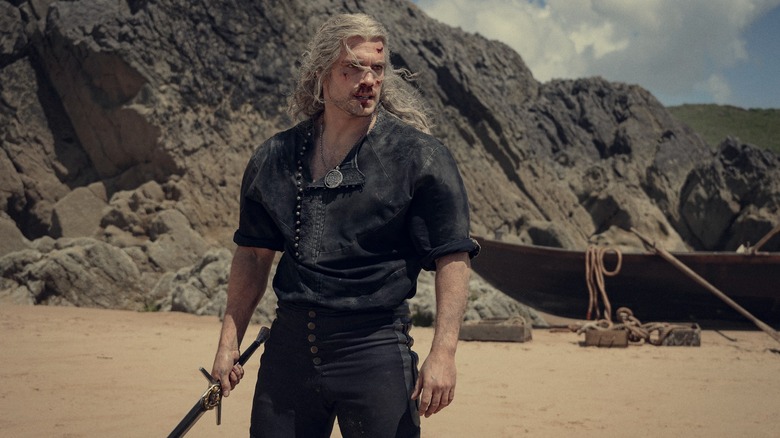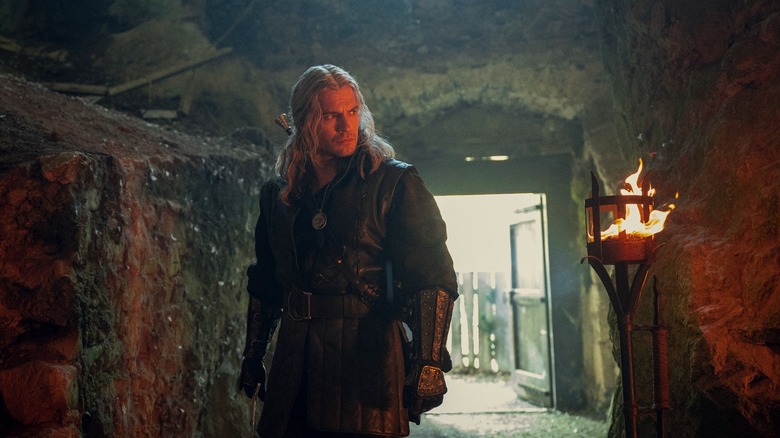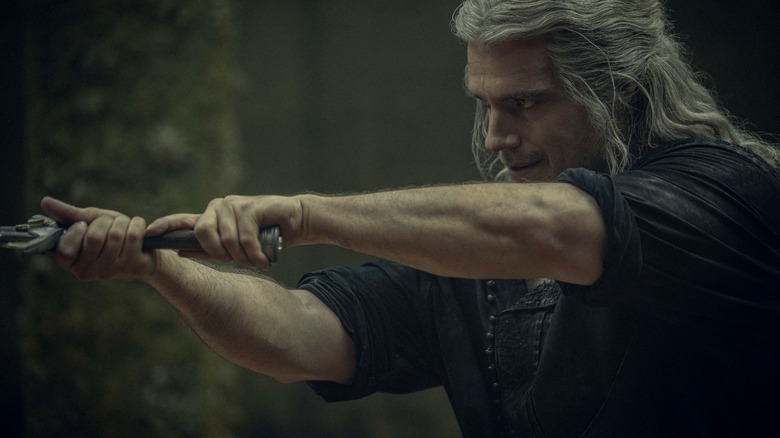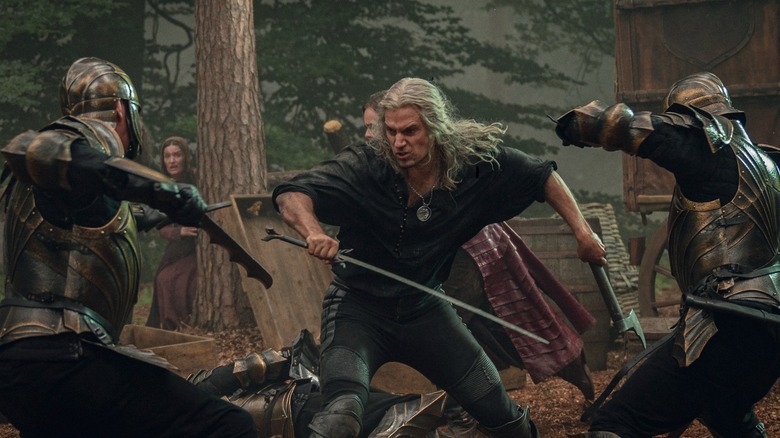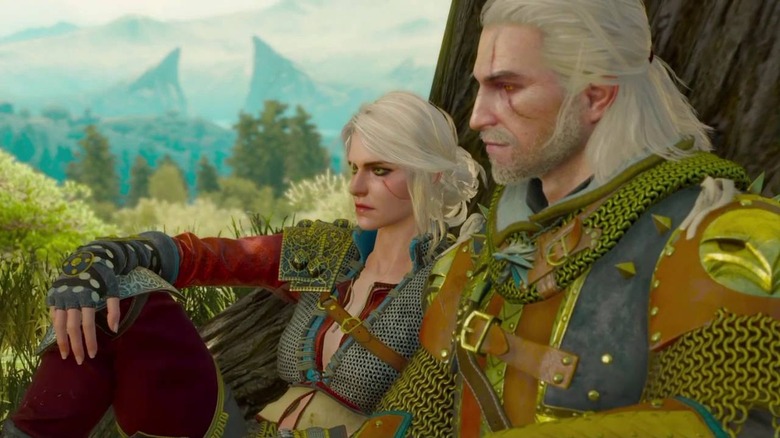Netflix's Witcher Does Not Give Henry Cavill's Geralt The Farewell He Deserves
This post contains spoilers for Netflix's "The Witcher" and the source material.
Henry Cavill's three-season run as Geralt of Rivia in Netflix's "The Witcher" has been nothing short of thrilling and eventful. Cavill, a long-time fan of the source material and the video game adaptations it spawned over the years, assumed the role of the gruff-voiced monster slayer with appropriate gusto and dedication. Like all good things that end at some point, Cavill's portrayal of Geralt is set to end with Volume II of the latest season, with Liam Hemsworth filling his shoes in the journey beyond. While this is old news, "The Witcher" showrunners have repeatedly promised that Cavill's sendoff will be grand and heroic, one worthy of the character's legacy and Cavill's contribution to the Netflix series. Unfortunately, this is not the case: Season 3 ends Geralt's journey on a painfully underwhelming note, giving the actor almost nothing to work with during his final moments in the show.
A heroic sendoff does not have to groundbreaking or revolutionary for it to be impactful — what truly matters is that the character bids us farewell in a way that's sincere and faithful to their ethos. Volume I of the latest season contained all the right ingredients that helped set up Geralt's (and Cavill's) goodbye in a meaningful manner, as it situated him as a witcher, a mentor, and a lover all at once. Volume 1 was able to capture the multidimensional depth inherent in Geralt, who is more than a mutant monster slayer who grunts now and then to express his emotions. However, Volume II promptly squanders this promising setup, as it juggles too many plotlines and gives Cavill's witcher very, very little to do. If we are being utterly honest here, this sendoff is, frankly, disrespectful.
Sidelined, and almost forgotten
Volume II picks up right after Spymaster Djikstra (Graham McTavish) holds a blade to Geralt's throat, saying that the witcher should have picked a side when he still had time. The coup is underway by now, and all the mages are bound with Dimeritium chains to contain their powers, while the orchestrators look on menacingly. Geralt acts in a quintessential Geralt way, stating that he "does not give a s*** about politics," and simply wishes to be on his way. After all, Geralt's only priority at this juncture is Ciri, and he simply wants to make sure that the girl is safe.
This makes sense, as Geralt has always been hyperfocused on protecting his loved ones, and could not care less whether the Continent was being ruled by Nilfgaard, Redania, or a third party. However, the chaos that unfolds during the coup sidelines Geralt's presence completely, as he's just standing awkwardly while Ciri (Freya Allan) or Yennefer (Anya Chalotra) have their big moments. There's just too much going on: Aretuza is on the verge of being destroyed, Tissaia (MyAnna Buring) goes berserk with grief, and Cahir (Eamon Farren) is hunting Ciri, but suddenly pleads for forgiveness when she challenges him to a fair fight. Geralt merely looks on, like some semi-important NPC.
Geralt is lured away by Vilgefortz (Mahesh Jadu) and the two engage in a fight, and the sorcerer is massively overpowered compared to the witcher. While the show follows the events of the books closely, the manner in which it's executed feels shoddy and rushed, lacking any true agency when brought to life on the screen. Geralt is meant to lose this fight, yes, but this defeat feels so forced, that viewers will gawk in disbelief seeing Geralt so easily beaten and wounded.
The Brokilon problem
In "Time of Contempt" — which season 3 primarily draws from — Geralt is sent to the Forest of Brokilon after sustaining severer wounds that prove to be near-fatal. The residents of Brokilon try their best to heal the witcher, but Geralt is more focused on pushing his bodily limits after he learns that Ciri is missing, and might even be dead. The Brokilon arc in Volume II is perhaps the most uninteresting: while the Continent is engulfed in chaos, these languid sequences feel wasteful and unnecessary, as we see Geralt being scolded for ignoring his bodily limits and pushing himself too far. At one point, there's a palpable tension that the witcher might just die due to the severity of his wounds, immediately undercut by a montage where he heals slowly and trains himself once again.
It's unclear whether this training sequence is meant to evoke strong emotions, as it does not accomplish anything meaningful when compared to Ciri's traumatizing Korath scenes or the mages trying to spring back from their major losses. The way the Brokilon scenes unfold might be meant to underline Geralt's dedication to saving Ciri, but there's no need for that in the first place, as it is amply clear that this is the case by now. Moreover, the heartfelt, comedic exchanges between Geralt and Jaskier (Joey Batey) are a welcome diversion, sure, but one cannot help but shake the feeling that time is running out. And it is.
The season finale tries to wrap up too many things at once, and unfortunately, Geralt's arc bears the brunt of being carelessly sidelined. While Geralt heals in Brokilon, Imposter Ciri has made her way to Nilfgaard and Tissaia's sudden death is a major emotional blow that is brushed off even before the impact sets in.
Geralt's 'big' neutrality moment
Geralt's major sendoff at the end of the season finale comes in the form of a shift in moral stance, or at least, that's how the show intends to portray it. After hearing about Ciri's disappearance, Geralt ventures out to find her with Jaskier by his side. The duo is stopped by a Nilfgaardian patrol, whom the witcher bribes to earn a passage. However, on seeing that the guard denied passage to a poor family and treated them cruelly, Geralt gives up his neutral stance and actively interferes by cutting down all the soldiers and keeping only one guard alive.
This is supposed to be a major character moment where Geralt extends empathy without expecting coin in return, as it is the morally right thing to do. However, the show seems to have forgotten that Geralt had already chosen a side: this is not the first time the witcher has interfered in events that do not directly concern him. His life as a monster slayer already puts him in moral dilemmas that require him to choose a side, examples ranging from the Renfri situation in season 1 to his role during the Thanedd Ball in season 3.
Given how unnecessary and heavy-handed this final moment is, it is difficult to view it as a heroic sendoff that does justice to Geralt — or Cavill, for that matter. Geralt's struggle with neutrality is an integral part of his character development, but the shift has been steadily in motion over the years. To portray it as a definitive, turning-point-style moment where he's suddenly righteous or empathetic is disingenuous — Geralt of Rivia has always been a fair, balanced monster slayer, trying his best to do right by the general populace even when he has no business doing so.
The Witcher 3: Wild Hunt is sublime for a reason
To wrap things up, I would like to provide an example of a character farewell done right within "The Witcher" universe itself, where Geralt's fate is choice-based but meaningful. In "The Witcher 3: Wild Hunt," the main storyline is peppered with quests that define Geralt's moral integrity or lack thereof, but a true-to-character playthrough would certainly end with him making decisions that honor and respect Ciri. While the show's circumstances are different, "Wild Hunt" ends with the "Blood and Wine" DLC that provides Geralt with one last adventure that underlines his inclinations to help people without expecting too much in return.
The vampire problem in Toussaint might be a job that Geralt has taken on, but it is way more than a simple job, as Geralt is emotionally invested in the characters he crosses paths with. He cares about outcomes, is mindful of the weight of his choices, and tries his best to take a route with the least amount of collateral damage. By this point, it becomes amply clear that Geralt's moral stance extends way beyond the safety of his loved ones — beneath his blunt, gruff nature is a man who feels torn, and desperately wishes to do the right thing. He is rewarded for his lifelong efforts in the game in the form of well-earned rest, and a visit from a loved one, which depends on the choices you make in the base game.
Cavill's time as Geralt has officially ended. Although his farewell as Geralt was not what he truly deserved, his shadow still looms large, and will hopefully pave the way for fresher, better beginnings.
Volume II of "The Witcher" season 3 is currently streaming on Netflix.
